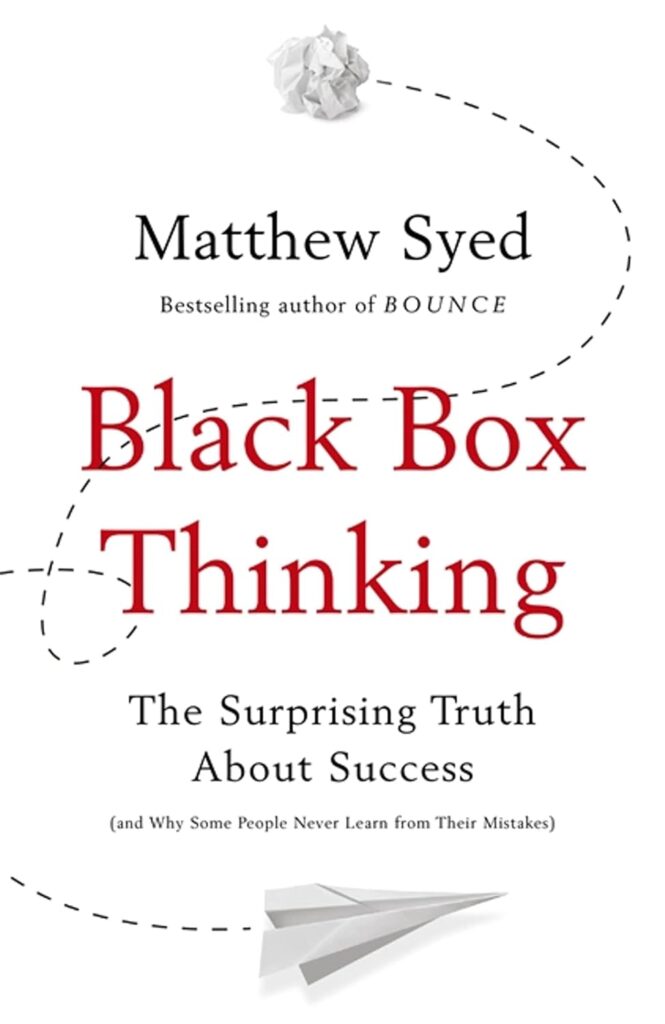Following up on my previous blog about Rebel Ideas by Matthew Syed, I took the recommendation from fellow readers to heart and dived into his other insightful work, Black Box Thinking. It was a fascinating read that shed new light on how we approach mistakes, learning, and ultimately, improvement. Coupled with his BBC radio series, the messages resonated deeply.

Here are some of the key takeaways that struck me:
1. The Spectrum of Improvement: Incremental vs. Phenomenal
Syed highlights the difference between incremental improvements and the rare, but crucial, instances of phenomenal innovation. Both are vital, but they operate differently. Incremental improvement is about refining what we already do, making it slightly better, faster, or more efficient over time. Phenomenal innovation, on the other hand, is the breakthrough – the game-changer that shifts paradigms.
The book underscores that both have their place. We need the steady progress of incremental improvements to build a strong foundation. But we also need the audacity of phenomenal innovation to leap forward into the future. It’s about recognising when to fine-tune and when to think big.
2. Embracing Failure for Faster Learning: Randomised Controlled Trials
One concept that particularly resonated was the idea of using randomised controlled trials (RCTs) to embrace failure as a learning tool. The principle is straightforward: “Be wrong as fast as we can.” By actively seeking out what doesn’t work, we can quickly identify flaws, learn from them, and pivot towards more effective solutions.
This approach contrasts sharply with cultures that fear failure or stigmatise mistakes. In environments where errors are seen as opportunities for growth, rather than reasons for blame, progress can accelerate significantly.
This also ties into creativity, which happens when you are away from the desk or when you receive conflicting information. Don’t restrict brainstorms to no criticism. Criticism can fuel creativity, in turn resulting in progress. Taking a break in that case seems only wise personally, which is why I ended up binge-watching the Netflix series ‘Department Q’ after absorbing all this thought-provoking material!

3. The Destructive Blame Game vs. Constructive Learning
Black Box Thinking powerfully illustrates the difference between cultures that foster a blame game when things go wrong and those that prioritise learning from errors. The former often leads to stagnation and hidden problems, while the latter can drive remarkable improvements and safety.
It’s easy to blame the system, or the actions or inactions of those around us, when we don’t succeed. Syed points out that the higher the status of the decision or the person, the harder it becomes to accept mistakes. There’s often a strong desire to maintain the status quo, leading to the dismissal of evidence that contradicts initial decisions, especially after mistakes have been made.
Decisions always look different with perfect hindsight. However, the key takeaway is that fostering an environment where failures are analysed constructively, rather than covered up, is crucial for growth and innovation.
4. Mindset Matters: Fixed vs. Growth
The book delves into the concept of mindset, specifically, the contrast between a fixed mindset and a growth mindset. Research mentioned by Syed showed an interesting electrical brain signal difference between the two. Individuals with a growth mindset exhibited a higher magnitude signal when processing errors, suggesting a more active learning response.
This aligns with observations in children. When faced with difficult problems, kids with a fixed mindset might respond with thoughts like, “I guess I’m not very smart,” or “I don’t have very good memory.” This often leads to deteriorating strategies even when faced with simpler problems later. Conversely, children with a growth mindset often react with, “I love a challenge,” or view mistakes as “our friend.” In studies referenced by Syed, over 80% of kids with a growth mindset improved their strategies after encountering a challenge.
This made me ponder the educational environment. I previously blogged about my vertical planter experiment (“Can Vertical Planter help beat the slugs?”). The early result is that the vertical planter might have beaten the slugs, but the birds still beat me by nipping the first ripe strawberry before I could even see it turn red! It’s a small victory, but a learning experience nonetheless.
This gardening anecdote mirrors a broader question I have about education: particularly in the UK, schools are often highly encouraging and rarely provide negative feedback or significant challenges. If a child is struggling, the work is often adjusted to ensure they “enjoy” it. While this approach aims to build confidence in the short term, are we inadvertently setting children up for future challenges when the real world might not adjust its difficulty level just because you are struggling? It’s a delicate balance between nurturing confidence and preparing for real-world adversity.
Similarly, Syed discusses the concept of self-handicapping – consciously creating obstacles or making excuses before an action, so that whatever the outcome, there’s something to blame (like “I only got this grade because I was up all night partying”). This preemptive move shields one’s self-esteem but hinders genuine learning and improvement.
Conclusion: Learning from the Journey
Black Box Thinking has been a thought-provoking journey. It challenges us to look at errors not as failures to be hidden, but as invaluable data points for progress. Whether it’s improving energy systems in my R&D work, fostering creativity in card-making with my daughter, or learning from the quirks of nature in my garden, the principle remains: understanding why things go wrong is often the key to making things go right.
Let’s strive to cultivate a ‘black box’ mindset in all areas of our lives – one where we learn relentlessly from every experience.
